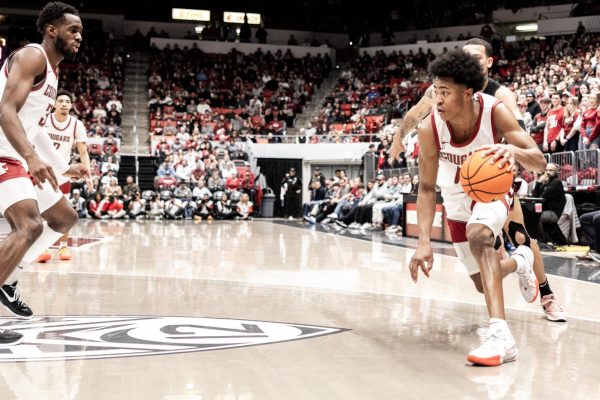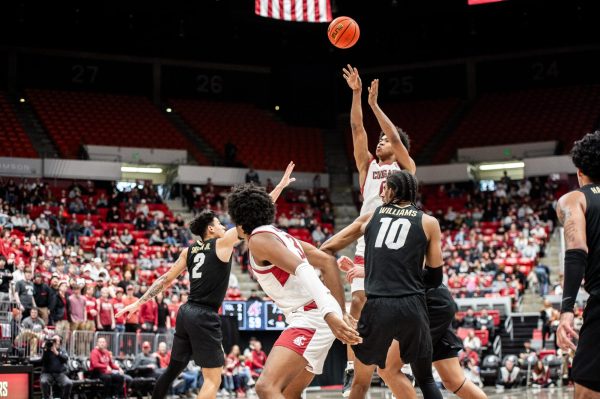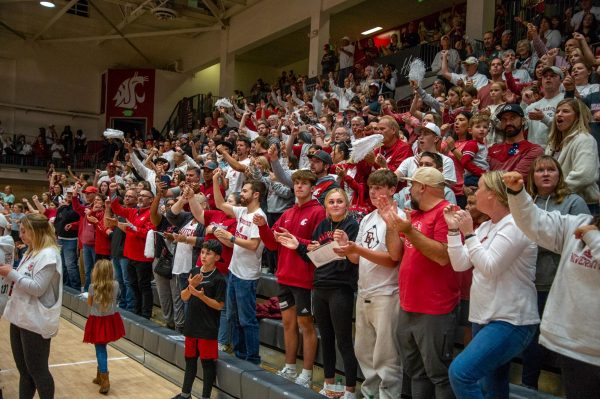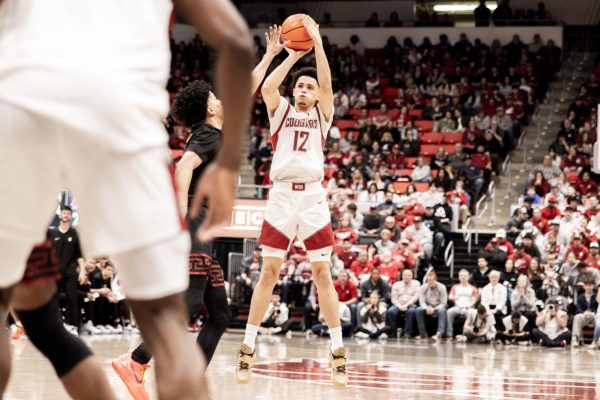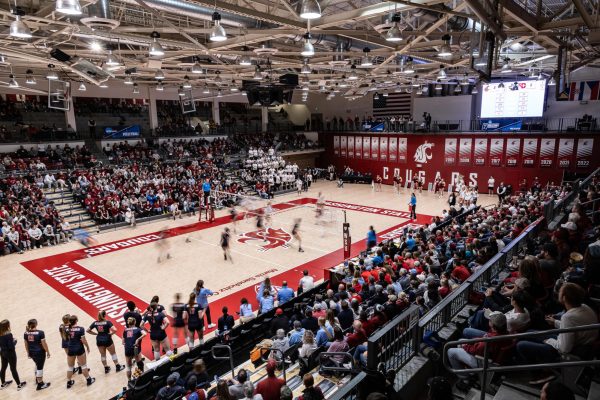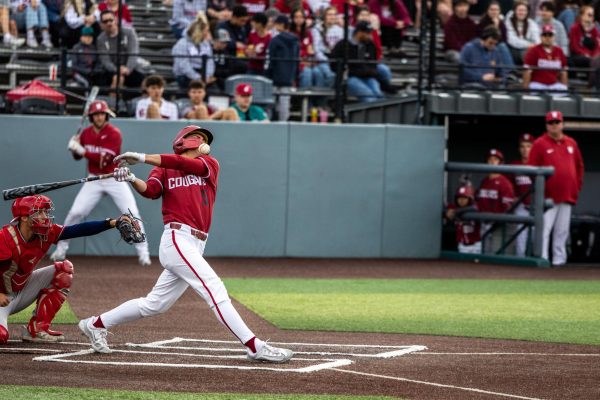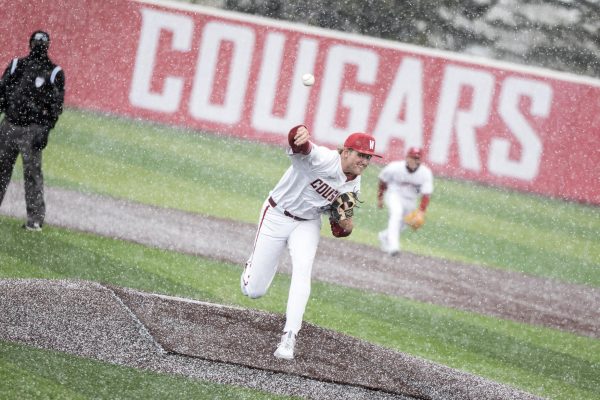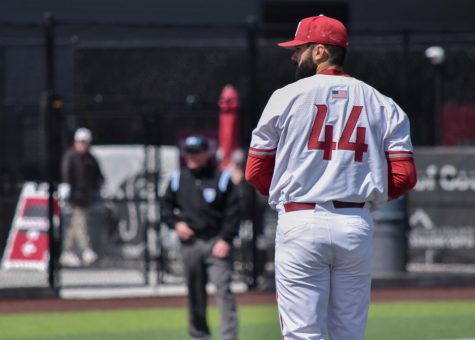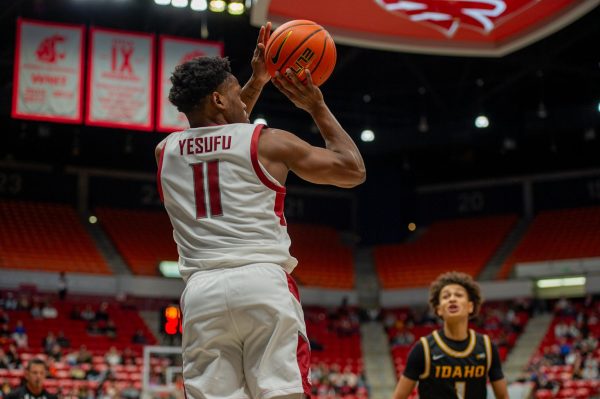Sitting down with Stephens
November 12, 2015
Among Washington State’s student-athletes, Cougar volleyball junior Tani Stephens immediately stands out.
As The Daily Evergreen sat down and peppered her with questions, and she had thoughtful and genuine answers for everything from her play on the court to the her father’s influence in her life and career.
Her father – her coach and mentor – who has only missed two of her collegiate games in three years, always told her to never let people’s and coaches’ perceptions of her 5-foot-8-inch frame get in the way of her success.
With a 3.74 GPA, Stephens has proved ever since middle school that one can become a scholar-athlete without sacrificing the principle of chasing one’s dreams.
The Daily Evergreen (DE): What’s your best asset you provide to the team?
Tani Stephens (TS): I feel like I’ve become more of a vocal leader this year. I used to not speak so much, so when I do now, I think it makes more of an impact with my team. I’ve always been quieter in my attitude and my demeanor, but I really feel like I have come into my own as a leader on this team. Coming in, I was super quiet and all (the coaching staff) wanted me to do was be more vocal. So I’m really proud of how I have sort of come into my own.
DE: Why did you choose WSU coming out of West Albany High School in Oregon?
TS: I thought that it was similar to OSU’s campus, which I’ve always grown up around. And I always liked that campus feel, where sporting events are more centralized and easy to get to. (Pullman) is also close to home, but not far away enough that I’m basically going home every weekend. It’s about a 6-and-a-half hour drive away, so my parents can still come to every game.
DE: Describe the recruitment process with WSU.
TS: Jen actually came to my club practice my junior year and she was recruiting another girl who was previously in our club program but was playing at another university and wanted to switch schools. So she came to watch her and ended up seeing me and talked to my coaches. Then Burdette emailed me the very next day saying, “Hey, we genuinely want you.’
DE: What are some of your best memories from Albany and Corvallis?
TS: I played sand a lot growing up, and I think that’s one of the reasons that I’m the player that I am today. It’s just such a volleyball community, both indoor and with the clubs. Like any place you play sports, you meet so many people that when I go back to Oregon for games, there’s so many people there just to watch volleyball. The connections I made there never go away.
DE: You were the Gatorade High School Volleyball Player of the Year and won a state championship your senior year in high school. Without outstanding accolades like the one’s you have, are volleyball players in Oregon at a disadvantage in the recruiting game?
TS: It’s definitely harder to get seen in a place like Oregon. I had to travel an hour-and-a-half to play for the best club and coach I could find. It’s so spread out in Oregon that it is rare to find a team and coach that are the best group together. Because of that, I think people don’t go and look there unless they’re from a small school or looking at an amateur team outside of Oregon.
DE: I know you did NHS in high school and were named to the Pac-12 All-Academic honorable mention team last year. What is the key for a talented athlete to balance his or her academic and athletic paths?
TS: I’ve always found myself to have a high expectation for myself academically because I’ve always taken it to heart when people say, ‘What do you have once volleyball is done?’ I imagine myself playing volleyball forever, but not always as a career. I want to grow up and enjoy the career that I’m in and some of those careers are highly competitive.
DE: What do you see yourself doing once you graduate with a sports science major?
TS: I don’t really have my options completely narrowed down yet. I came in thinking that I wanted to do physical therapy but a couple classes changed my mind and a couple observations of how many people wanted to do physical therapy changed my mind. I realized that I like working with children and I like working with athletes.
So if that takes me to a path of teaching and coaching, then that’s what I’ll do. If it takes me to a Boys and Girls Club, then that’s what I’ll do. But I’ve always loved working in leadership. And I think that whatever I do as a career, I’d like to involve leadership in it, whether that’s working a camp for kids or with teams that I’m coaching.
DE: What influence did your dad have on your volleyball career?
TS: My dad had a huge impact on my volleyball career. He has always been involved with volleyball since he was in high school. He played and then played in men’s and sand leagues. I grew up with both of my parents playing in a private sand league at a private court some of their friends had.
So I’d play and then watch the parents play and once I started to take interest in volleyball, he jumped right on it. He was never one to push me into volleyball, but once I took a liking to it, it was all volleyball from there. He coached me a couple years in middle school and one season in club, and other than that I had all different coaches, but he was always that at-home coach or sideline coach.
Being an assistant coach and coming to every club practice, just a highly respected coach in our area and most people liked to or were interested in hearing what he had to say. At home, just someone I could trust or listen to and just get advice from volleyball-wise. Even to this day, he’ll still give me a pointer or two here-and-there. Just a huge supporter of me and my successes.
DE: He still comes to all of your games?
TS: Yeah! My freshman year, my parents missed just the Colorado and Utah games. Last year they made all of them and this year they’ll make all of them.
DE: What’s the greatest lesson he has taught you in your life?
TS: Probably that you can do anything that you put your mind to. Again, I’m what, like 5-7? And at every level I’ve been at, except maybe in middle school, I’ve been undersized. I’ve played every single position in volleyball including middle positions and setting.
He’s always said don’t let anyone tell you that you’re not capable of doing something. You’re always capable of doing it. Each year with a new coach, it’d be time to prove myself again because I’m undersized. I’d never start at the front row because I’m undersized but I’d always find my way to finish the season at the front or whatever position I was needed at.
Sophomore through senior year when I moved up to The Big Dog club, an hour-and-a-half away, my coach was like, ‘you’re going to be our lib, you’re going to be our setter.’ But it only took a couple of tournaments before I found myself in the front row for the rest of the season. You know, even here, I’m a defensive specialist but I serve, I hit in practices, I still do it all. I think that me having to prove myself over and over to coaches has made me the player that I am today.





